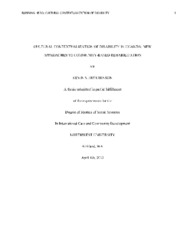Cultural Contextualization of Disability In Uganda: New Approaches to Community-Based Rehabilitation
Abstract
The author outlined a method that aimed to improve the lives of people with disabilities in developing nations. The model, community based rehabilitation, is the popular standard in providing care to people with disabilities in rural areas of developing nations. The author of this thesis argued that the community based rehabilitation model has traditionally been focused too much on the individual rather than the community surrounding the individual. Children with disabilities have often been stigmatized and rejected in many rural communities in developing nations. This author used a case study that showed different aspects of the Ugandan society that perpetuate these stigmatizations and rejections of children with disabilities. To overcome these stigmatizations in the Ugandan culture, the author responded by recommending ways to change these negative perceptions. The recommendations start with community based rehabilitation workers knowing the intricacies of the culture they are working in and, secondly, advancing participatory methods within each community. Specific examples to how to implement these methods are outlined as well as real-world examples and stories from the field.
Contents
Introduction to disability in Uganda
Introduction to community-based rehabilitation
Disability in the Ugandan culture. Traditional beliefs of impairments; Religion in Uganda and the role of the church; Education in Uganda; Conclusion
Recommendations. Conscietization; Cultural dimensions and education; Participatory methods
Original item type
Microsoft Word (DOC)
Original extent
59 pages
Collections
Copyright
This original work is protected by copyright. Copyright is retained by the author(s). Works may be viewed, downloaded, or printed, but not reproduced or distributed without author(s) permission.


 Maintained by the Northwest University Library
Maintained by the Northwest University Library